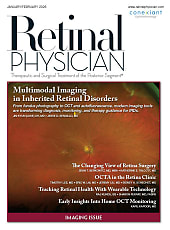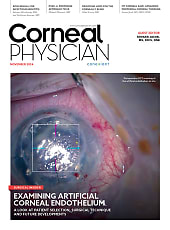This article was originally published in a sponsored newsletter.
At the end of 2018, there were 17 firms in the ophthalmology private equity (PE) space.1 Despite the Covid-19 pandemic, this number increased to 31 by the end of 2020 and is predicted to be close to 45 by the end of 2021.2 Current PE investments are estimated to be approximately $2.5 trillion, with about 25% allotted for health care.2 This significant amount of potential investment means both small and large eyecare providers in the United States will continue to be pursued in 2022.
Although PE deals are more complicated now, physicians in multispecialty ophthalmology practices and retina-only groups are more eager to explore the potential opportunities of PE integration to mitigate potential practice difficulties such as pandemic shutdowns, shrinking reimbursements, and complicated billing requirements. Here are some considerations before deciding whether PE is the right fit for you—or if you should follow traditional practice models.
Private Equity Basics and Benefits
Earnings Before Interest, Depreciation, Taxes, and Amortization (EBIDTA) is used to determine acquisition price and is the basis for a PE firm's price for a practice. Practices are valued at a negotiated multiple of EBITDA, and most PE acquisitions close at a five-to-six multiple of EBITDA.3 If your operating expenses include physician compensation, PE firms will pull that amount out for valuation purposes ("normalized EBIDTA"). PE firms look for the potential to increase profits by adding providers, merging with or acquiring additional practices, and introducing or increasing noncovered services. PE firms that buy several practices usually create a platform, commonly termed a medical services organization (MSO), with an assembled corporate leadership team to facilitate growth. Ultimately, this is a major benefit of PE partnership in that the corporate leadership team is a more effective manager, allowing physicians to concentrate on patient care. Additional benefits of PE integration include marketing skills and advanced analytics for measuring practice performance.4
Is Private Equity Right for You?
This question centers on the relative importance of ownership and partnership; in a PE framework, you will not have the ability to become an owning partner.5 If you desire complete autonomy over practice logistics, capital expenditures, procedural volume, and staff employment, then PE is likely not the best fit for you.6 If you envision difficulties transitioning to an employee, you must carefully consider the trade-offs of working within a PE model so as to assess your suitability and satisfaction with a potential PE acquisition.
Conclusion
As discussed above, when considering if PE is an opportunity that is right for you, it is imperative to emphasize the trade-off of having a PE partner who will focus on practice management while you dedicate yourself primarily to patient-centered activities. Career objectives, geography, and external factors—such as reimbursement and competition—are all critical to ensuring the right decision. NRP
References
- Yetter E. List of private equity firms investing in ophthalmology practices and surgery centers. FOCUS Investment Banking. Accessed December 18, 2021. https://focusbankers.com/list-of-private-equity-firms-investing-in-ophthalmology-practices-and-surgery-centers/
- Bibet-Kalinyak I. Private equity in 2021. Cataract & Refractive Surgery Today. Accessed December 18, 2021. https://crstoday.com/articles/mar-2021/private-equity-in-2021/
- McKinney S. Is COVID forcing private equity into the sunset? Review of Ophthalmology. Accessed December 18, 2021. https://www.reviewofophthalmology.com/article/is-covid-forcing-private-equity-into-the-sunset
- Delaney-Gesing A. Ophthalmic practices eye private equity investors. Ophthalmology Times. Accessed December 18, 2021. https://www.ophthalmologytimes.com/view/ophthalmic-practices-eye-private-equity-investors
- Young A. Private equity ensures strong succession, peace of mind for some practices. Ocular Surgery News. Accessed December 18, 2021. https://www.healio.com/news/ophthalmology/20211029/private-equity-ensures-strong-succession-peace-of-mind-for-some-practices.
- Chen EM, Cox JT, Begaj T, Armstrong GW, Khurana RN, Parikh R. Private equity in ophthalmology and optometry: analysis of acquisitions from 2012 through 2019 in the United States. Ophthalmology. 2020;127(4):445-455. doi:10.1016/j.ophtha.2020.01.007









